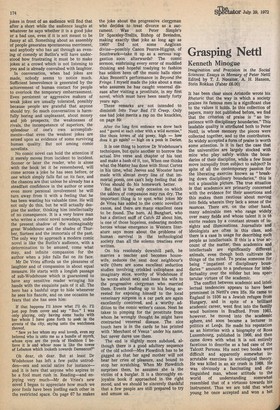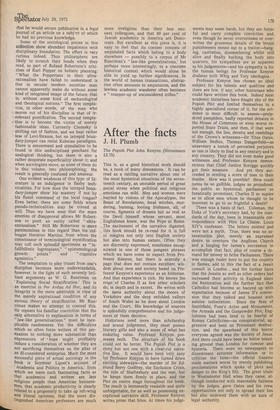Grasping Nettl
Kenneth Minogue
Imagination and Precision in the Social Sciences: Essays in Memory of Peter Nettl Edited by T. J. Nossiter, A. H. Hanson, Stein Rokkan (Faber £6.00)
It has been clear since Aristotle wrote his Rhetoric that the way in which a society praises its famous men is a significant clue to the values it holds. In this collection of papers, many not published before, we find that the criterion of praise is " an impatience with disciplinary boundaries." This laudable quality is attributed both to Peter Nettl, in whose memory the pieces were collected together, and to the contributors. So widely accepted a form of praise is worth some attention. Is it in fact the case that the universities are largely stocked with mice who play safely within the boundaries of their discipline, while a few lions move intrepidly from subject to subject? In spite of all the contemporary passion for the liberating exercise known as "breaking down disciplinary boundaries," this is not a plausible picture. The true situation is that academics are primarily concerned with the evidence for their assertions and this makes them cautious about moving into fields wherein they lack a sense of the nuances. There are, on the other hand, many admirable men who range widely over many fields and whose talent it is to excite readers by a constant stream of insights and illuminations. Journalists and ideologists are often in this class, and there is a case in usage for describing such people as intellectuals. If this is a true account of the matter, then academics and intellectuals are significantly different animals, even though both cultivate the things of the mind. To praise someone for being "impatient of disciplinary boundaries " amounts to a preference for intellectuality over the solider but less spectacular virtues of the academic.
The conflict between academic and intellectual tendencies appears to have been prominent in Nettl's own life. He came to England in 1936 as a Jewish refugee from Hungary, and in spite of a brilliant academic career, went first into the family wool business in Bradford. From 1961, however, he moved into the academic sphere, and soon became a lecturer in politics at Leeds. He made his reputation as an historian with a biography of Rosa Luxembourg, published in 1966, and then came down with what it is not entirely facetious to describe as a bad case of the Talcott Parsons. His next two books were difficult and apparently somewhat inscrutable exercises in sociological theory. He was killed in an air crash in 1968. He was obviously a fascinating and distinguished man, whose attitude to the world of understanding somewhat resembled that of a virtuoso towards his instrument. Thus we are told that when young he once accepted and won a bet that he would secure publication in a legal journal of an article on a subj,ct of which he had no previous knowledge.
Some of the sociological pieces in this collection show abundant impatience with disciplinary boundaries. The effect is very curious indeed. Thus philosophers are likely to scratch their heads when they read, as part of Roland Robertson's criticism of Karl Popper on holistic planning: "What the Popperians in their ultrarationalism have failed to understand is that in secular modern societies man cannot apparently make do without some kind of integrated image of the future, that is, without some kind of eschatological and theological notions." The first temptation, in other words, of the man who moves out of his discipline is that of irrelevant pontification. The second temptation is to become the victim of merely fashionable ideas. Currently Chomsky is shifting out of fashion, and we hear rather less of Levi-Strauss, but no intrepid boundary-jumper can resist Kuhnian paradigms. There is amusement and stimulation to be found in this undisciplined penchant for analogical thinking, but there is also a rather desperate superficiality about it; and when sociologists move, as some of them do in this volume, into philosophising, the result is generally confused and amateur.
One evident weakness of this type of literature is an indulgence in flashy technicalities. For how does the intrepid boundary-jumper show his mastery if not by his fluent command of the local tongue? Even better, there are some fields where pseudo-technicalities may be coined at will. Thus we have seen that the mere emotion of disapproval allows Mr Robertson to posit an entity called "ultrarationalism." Still Mr Robertson is more parsimonious in this regard than his colleague Hermino Martins, from whom the connoisseur of terminological mystification may cull such splendid specimens as " infallibilistic logotopians," " epistemological growth points" and "cognitive agonistics."
The temptation to play truant from one's discipline becomes more understandable, however, in the light of such severely brilliant arguments as W. G. Runciman on Explaining Social Stratification.' This is an exercise in Per A rdua Ad Hoc, and its integrity is the more admirable in view of the merely aspirational condition of any serious theory of stratification. Mr Run, ciman makes no attempt to conceal this. He repeats his familiar conviction that the Only alternative to explanation in terms of "law-like generalisations" must be inexplicable randomness. Yet the difficulties which so often force writers of this persuasion to nothing more substantial than expressions of hope might profitably induce a consideration of whether they are not sacrificing themselves on the altar of an ill-considered enterprise. Much the most successful piece of actual sociology in the book is Seymour Lipset's account of Academia and Politics in America,' from Which we learn such fascinating facts as that academics and writers are less religious people than American businessmen, that academic productivity is clearly related to a propensity to take up left-wing and liberal opinions, that the more distinguished American professors are much more irreligious than their less eminent colleagues, and that 80 per cent of Jewish academics in America are Democrats. But excellent as this piece is, it is easy to feel that its content consists of amputated facts which belong to a body elsewhere — possibly to a corpus of Mr Runciman's "law-like generalisations,' but perhaps more interestingly, to a concrete historical context which would alone be able to yield up further significances. In the world of human transactions, abstraction often amounts to amputation, and the lawless academic wanderer often becomes
"snapper-up of unconsidered trifles."









































 Previous page
Previous page